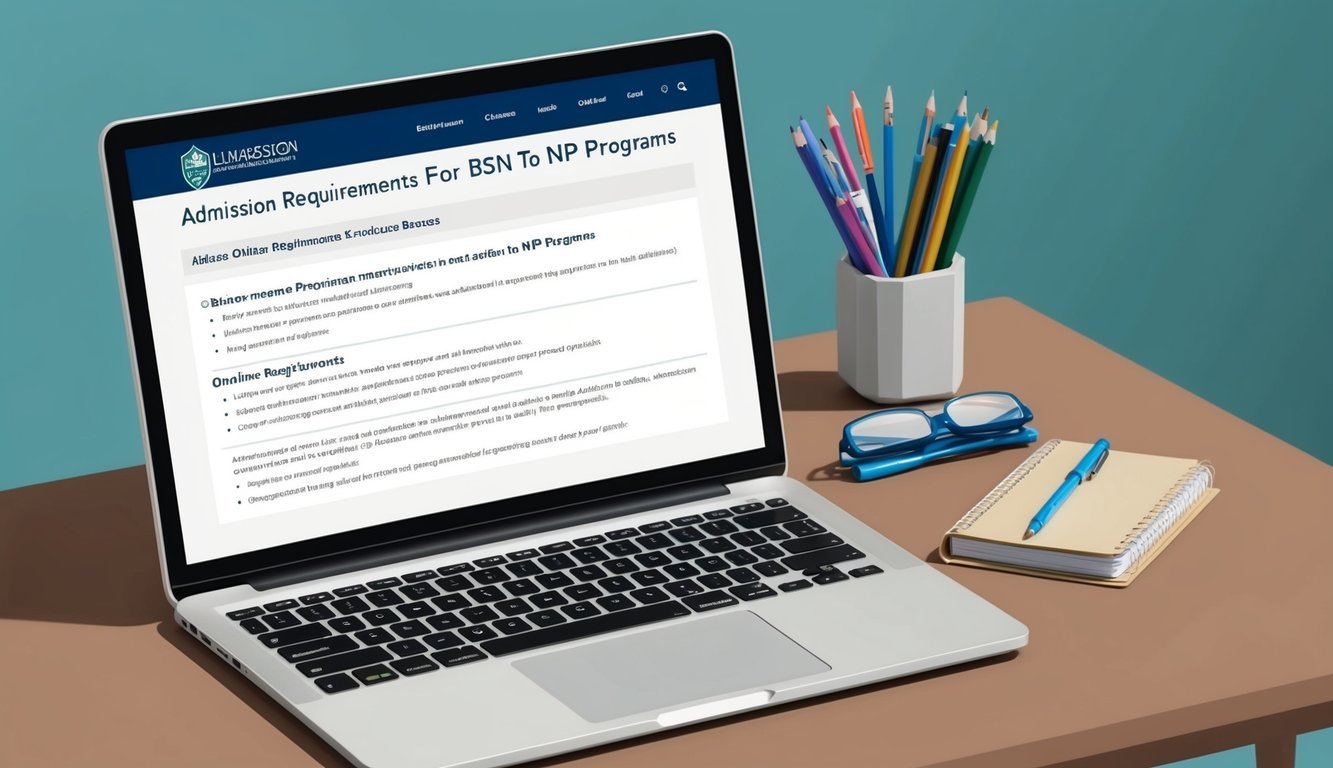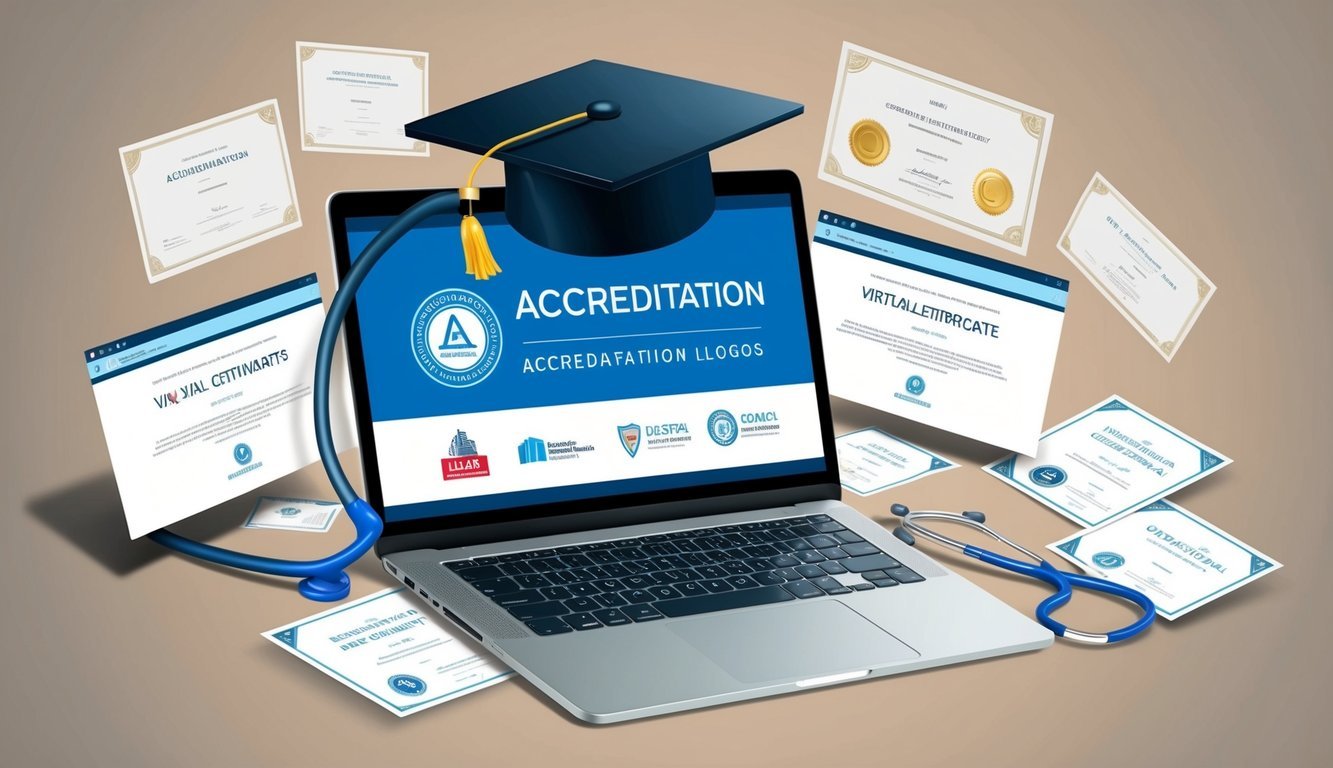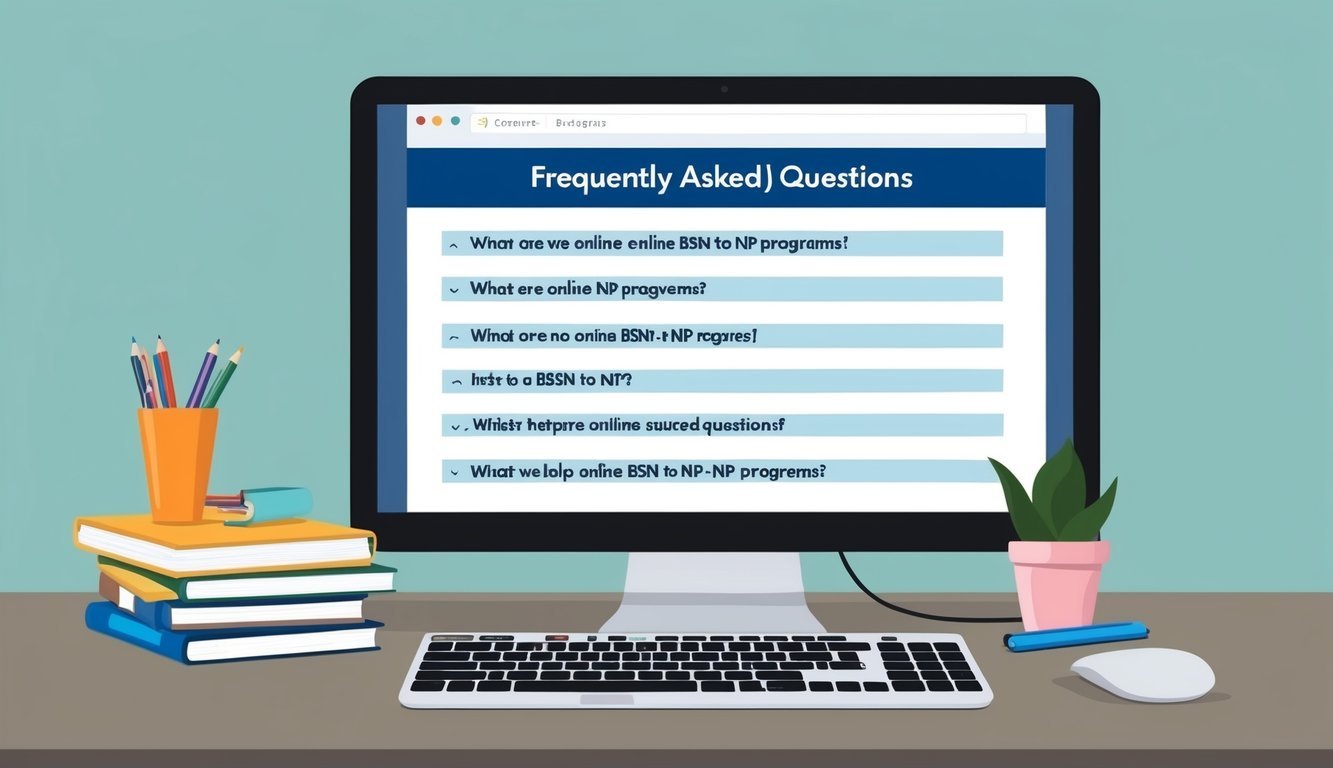If you’re a registered nurse looking to advance your career, you can choose online BSN to NP programs. These programs allow you to earn a Nurse Practitioner degree while maintaining your current job and schedule.
With flexible learning options, you can gain the skills and knowledge you need.
This way, you can provide high-quality patient care, specialize in various fields, and increase your earning potential.
Exploring these programs can open doors to numerous career opportunities.
Admission requirements often vary by institution, but many programs accept applicants with a Bachelor of Science in Nursing (BSN) from accredited schools.
You will also benefit from a structured curriculum that combines online coursework with clinical training.
This ensures you gain the hands-on experience necessary for the NP role.
As you consider this educational path, keep in mind the importance of program accreditation and financial planning.
The right program will enhance your qualifications and prepare you for certification.
Key Takeaways
- Online BSN to NP programs offer flexible pathways for registered nurses.
- Admission requirements typically include a BSN and clinical experience.
- Accreditation and financial planning are crucial for choosing a successful program.
Exploring Online BSN to NP Programs
As you consider advancing your nursing career to become a Nurse Practitioner (NP), it’s important to understand the roles you will take on and how online platforms can support your education.
This section breaks down the specifics of NP roles and the advantages of distance learning.
Defining Nurse Practitioner Roles
Nurse Practitioners play a crucial role in healthcare.
They provide care in various specialties, including family health, pediatrics, and mental health.
Key responsibilities include:
- Diagnosing and treating illnesses
- Managing patient care
- Prescribing medications
To become a successful NP, you need a solid foundation in clinical skills and patient interaction.
Many online BSN to NP programs place a strong focus on these areas to ensure you are well-prepared for real-world challenges.
With the right education, you can enhance your ability to deliver quality care to your patients.
Online Learning Platforms and Distance Learning
Online NP programs offer flexibility for working nurses.
Many universities have created robust platforms that facilitate remote learning.
Key features of these platforms include:
- Interactive coursework
- Access to digital resources
- Online discussion forums
These programs often incorporate various learning methods, such as video lectures and virtual simulations.
Your education will include both theoretical knowledge and practical skills, making it easier for you to balance work and study.
Additionally, courses are designed to be engaging and supportive through constant interaction with faculty and peers.
This distance learning format can help you obtain your nursing degree while maintaining your current job.
For example, you can explore the best online BSN to NP programs here.
Admission Requirements and Prerequisites

Before you apply to an online BSN to NP program, it’s essential to understand the specific admission requirements and prerequisites.
These requirements typically include educational background, clinical experience, and licensing.
Educational Background
To be eligible for a BSN to NP program, you need a Bachelor of Science in Nursing (BSN) degree from an accredited institution.
This ensures you have the foundational knowledge needed for advanced practice.
Many programs require a minimum GPA of 3.0.
You must also submit official transcripts as part of your application.
Additionally, some universities may require you to have completed specific coursework, such as:
- Pathophysiology
- Pharmacology
- Health Assessment
Make sure to check the specific requirements of each program you’re considering, as they can vary.
Clinical Experience and Licensing
Most programs require applicants to hold an active, unencumbered Registered Nurse (RN) license.
This means that your nursing license should be valid and without any restrictions.
Clinical experience is also crucial.
Many programs ask for 1-3 years of clinical experience as an RN, specifically in areas relevant to the NP role.
This allows you to gain practical knowledge and skills.
You might also need to provide documentation of your clinical hours.
This helps programs assess your readiness for advanced nursing practice.
Program Curriculum and Specializations
The curriculum for online BSN to NP programs is designed to provide you with the necessary knowledge and skills for advanced nursing practice.
You will study core subjects and choose from various specializations to tailor your education to your interests and career goals.
Core Subjects and Advanced Practice Courses
In your program, you will cover essential topics that form the foundation of advanced nursing.
Core subjects typically include:
- Pathophysiology: Understand disease processes and their effects on the body.
- Pharmacology: Learn about medications and their therapeutic uses.
- Health Assessment: Develop skills in physical examinations and patient evaluations.
- Evidence-based Practice: Gain knowledge on integrating research into clinical decision-making.
Additionally, advanced practice courses will prepare you for roles as a nurse practitioner.
These may include coursework on clinical skills and specialized nursing care techniques that are vital for your future practice.
Specialization Tracks and Electives
You can choose a specialization track that aligns with your career goals.
Some popular options include:
- Family Nurse Practitioner: Focus on providing comprehensive care for individuals and families.
- Psychiatric Mental Health Nurse Practitioner: Specialize in mental health assessment and treatment.
- Adult-Gerontology Nurse Practitioner: Concentrate on care for older adults and geriatric populations.
- Pediatric Nurse Practitioner: Work specifically with children and adolescents.
- Neonatal Nurse Practitioner: Provide care for newborns, especially those who are critically ill.
Electives may allow you to further explore areas of interest, enhancing your expertise in your chosen field.
Each specialization prepares you for different patient care contexts, ensuring you are well-equipped to meet the needs of diverse populations.
For more information on program details, consider visiting resources like Nurse.org.
Clinical Training and Mentorship

In online BSN to NP programs, clinical training and mentorship are crucial for developing your clinical skills and preparing you for practice.
You will participate in clinical residencies and practicums, while also receiving guidance from experienced mentors.
These components shape your learning experience and professional development.
Clinical Residencies and Practicums
Clinical residencies and practicums are hands-on experiences where you apply your nursing knowledge in real-world settings.
During these experiences, you will complete a required number of clinical hours, typically ranging from 500 to 1,000, depending on your program.
These experiences allow you to:
- Work under supervision: You collaborate with experienced nurse practitioners and healthcare professionals.
- Enhance your clinical skills: Gain confidence in areas like patient assessment, diagnosis, and treatment planning.
- Engage with diverse populations: Experience various healthcare settings, which helps you understand different patient needs.
Finding programs that offer structured clinical rotations can improve your learning experience.
Consider institutions like Duke University, which provides high-quality residency training opportunities.
Mentorship in Advanced Practice Nursing
Mentorship plays a vital role in your transition from student to nurse practitioner.
When you have an experienced mentor, you gain insights into practical skills and professional growth.
Mentorship often includes:
- Guidance during clinical experiences: Your mentor helps you navigate complex cases and encourages critical thinking.
- Career advice: Mentors can provide networking opportunities and job search strategies.
- Ongoing support: Regular check-ins foster a relationship that can last throughout your career.
Participating in a strong mentorship program ensures that you are well-prepared for the challenges of advanced practice nursing.
Seek programs that prioritize mentor-mentee relationships to maximize your professional growth.
Accreditation and Certification

Accreditation and certification are crucial aspects when pursuing an online BSN to NP program.
Understanding these factors ensures you select a reputable program and are prepared for the required licensure after graduation.
Choosing an Accredited Online NP Program
When selecting an online Nurse Practitioner program, it’s essential to choose one that is accredited.
Look for programs accredited by recognized bodies like the Commission on Collegiate Nursing Education (CCNE) or the Accreditation Commission for Education in Nursing (ACEN).
Accreditation signifies that the program meets high educational standards.
Here’s a list of questions to consider:
- Is the program accredited by a recognized agency?
- Does the accreditation align with the licensure requirements in your state?
- Are faculty members qualified and experienced?
Choosing an accredited program can smooth your path to certification and increase your employability.
Certification and Licensure Post-Graduation
After completing your NP program, you must obtain certification to practice as an Advanced Practice Registered Nurse (APRN).
This involves passing a certification exam administered by the American Nurses Credentialing Center (ANCC) or other certifying bodies.
Steps to achieve certification include:
- Determine your specialty area (e.g., family, pediatric).
- Apply for the certification exam relevant to your specialty.
- Prepare for the exam using study materials and review courses.
Once you pass the exam, you can apply for licensure in your state.
Remember that maintaining your certification may require continuing education and periodic renewal, so check the requirements for your specific state.
Costs and Financial Planning for Students
Understanding the costs associated with online BSN to NP programs is crucial for your financial planning.
You will need to consider tuition rates, additional fees, and potential financial aid options to manage your education expenses effectively.
Understanding Tuition and Fees
Tuition rates can vary significantly among online BSN to NP programs.
On average, you may encounter fees ranging from $400 to $700 per credit hour.
Here’s a breakdown of estimated costs:
| Program | Tuition per Credit Hour |
|---|---|
| University of West Florida | $212 (in-state), $641 (out-of-state) |
| Delta State University | $469 |
| University of Alabama | $440 |
In addition to tuition, also factor in costs for books, technology fees, and clinical placement expenses.
It is essential to calculate these costs early to aid in your budgeting.
Scholarships and Financial Aid
Many programs offer financial aid and scholarship opportunities.
Scholarships can reduce your overall expenses significantly.
Check specific schools for available scholarships dedicated to nursing students.
Additionally, you should consider applying for federal student aid.
Completing the FAFSA can make you eligible for grants, loans, and work-study programs.
Some helpful resources include:
Be proactive in researching and applying for these financial aids to help manage your educational costs effectively.
Frequently Asked Questions

There are several important aspects to consider when looking into online BSN to NP programs.
This section addresses common questions about admission requirements, program length, specializations, and the clinical components involved.
What are the typical admission requirements for online BSN to NP programs?
Most online BSN to NP programs require a Bachelor of Science in Nursing (BSN) from an accredited institution.
You will generally need a minimum GPA, often around 3.0, and some programs require clinical experience as a registered nurse.
Additional materials like recommendation letters and a personal statement may also be needed.
How can I find accredited online BSN to NP programs in California?
To find accredited programs, you can visit the Commission on Collegiate Nursing Education (CCNE) website or the Accreditation Commission for Education in Nursing (ACEN) website.
These organizations provide lists of accredited nursing programs.
You can also check with local universities for specific offerings in California.
What is the average length of an online Nurse Practitioner program following a BSN?
Typically, online Nurse Practitioner programs take about 2 to 4 years to complete.
The duration depends on whether you choose to study part-time or full-time.
These programs usually require you to complete a specific number of clinical hours in addition to coursework.
Are there any online NP programs that offer a Family Nurse Practitioner specialization?
Yes, many online NP programs provide a Family Nurse Practitioner (FNP) specialization.
This focus allows you to gain the skills necessary to provide care across the lifespan.
Programs like those offered by Baylor University offer specific pathways for FNP training.
What factors should be considered when choosing an online NP program?
When selecting a program, consider accreditation, faculty qualifications, clinical placement opportunities, and overall program reputation.
You should also assess financial aid options and whether the program aligns with your career goals.
How does the clinical component of an online NP program typically work?
The clinical component generally involves hands-on experience in healthcare settings.
You will complete a required number of clinical hours under the supervision of a licensed nurse practitioner or physician.
Many programs assist in finding placements, or you may have the flexibility to choose your location.

